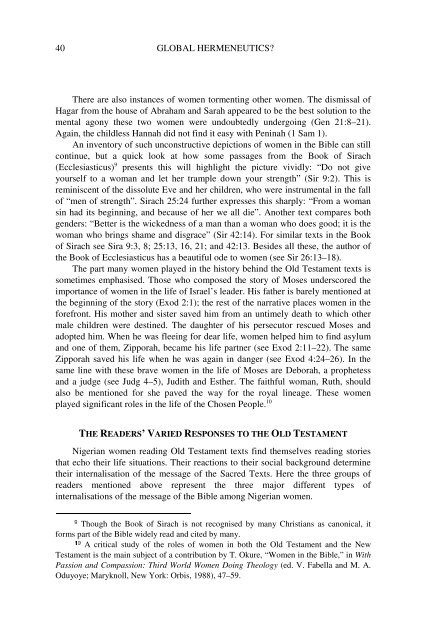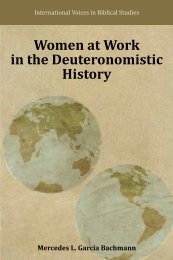Global Hermeneutics? - International Voices in Biblical Studies ...
Global Hermeneutics? - International Voices in Biblical Studies ...
Global Hermeneutics? - International Voices in Biblical Studies ...
Create successful ePaper yourself
Turn your PDF publications into a flip-book with our unique Google optimized e-Paper software.
40 GLOBAL HERMENEUTICS?<br />
There are also <strong>in</strong>stances of women torment<strong>in</strong>g other women. The dismissal of<br />
Hagar from the house of Abraham and Sarah appeared to be the best solution to the<br />
mental agony these two women were undoubtedly undergo<strong>in</strong>g (Gen 21:8–21).<br />
Aga<strong>in</strong>, the childless Hannah did not f<strong>in</strong>d it easy with Pen<strong>in</strong>ah (1 Sam 1).<br />
An <strong>in</strong>ventory of such unconstructive depictions of women <strong>in</strong> the Bible can still<br />
cont<strong>in</strong>ue, but a quick look at how some passages from the Book of Sirach<br />
(Ecclesiasticus) 9 presents this will highlight the picture vividly: “Do not give<br />
yourself to a woman and let her trample down your strength” (Sir 9:2). This is<br />
rem<strong>in</strong>iscent of the dissolute Eve and her children, who were <strong>in</strong>strumental <strong>in</strong> the fall<br />
of “men of strength”. Sirach 25:24 further expresses this sharply: “From a woman<br />
s<strong>in</strong> had its beg<strong>in</strong>n<strong>in</strong>g, and because of her we all die”. Another text compares both<br />
genders: “Better is the wickedness of a man than a woman who does good; it is the<br />
woman who br<strong>in</strong>gs shame and disgrace” (Sir 42:14). For similar texts <strong>in</strong> the Book<br />
of Sirach see Sira 9:3, 8; 25:13, 16, 21; and 42:13. Besides all these, the author of<br />
the Book of Ecclesiasticus has a beautiful ode to women (see Sir 26:13–18).<br />
The part many women played <strong>in</strong> the history beh<strong>in</strong>d the Old Testament texts is<br />
sometimes emphasised. Those who composed the story of Moses underscored the<br />
importance of women <strong>in</strong> the life of Israel’s leader. His father is barely mentioned at<br />
the beg<strong>in</strong>n<strong>in</strong>g of the story (Exod 2:1); the rest of the narrative places women <strong>in</strong> the<br />
forefront. His mother and sister saved him from an untimely death to which other<br />
male children were dest<strong>in</strong>ed. The daughter of his persecutor rescued Moses and<br />
adopted him. When he was flee<strong>in</strong>g for dear life, women helped him to f<strong>in</strong>d asylum<br />
and one of them, Zipporah, became his life partner (see Exod 2:11–22). The same<br />
Zipporah saved his life when he was aga<strong>in</strong> <strong>in</strong> danger (see Exod 4:24–26). In the<br />
same l<strong>in</strong>e with these brave women <strong>in</strong> the life of Moses are Deborah, a prophetess<br />
and a judge (see Judg 4–5), Judith and Esther. The faithful woman, Ruth, should<br />
also be mentioned for she paved the way for the royal l<strong>in</strong>eage. These women<br />
played significant roles <strong>in</strong> the life of the Chosen People. 10<br />
THE READERS’ VARIED RESPONSES TO THE OLD TESTAMENT<br />
Nigerian women read<strong>in</strong>g Old Testament texts f<strong>in</strong>d themselves read<strong>in</strong>g stories<br />
that echo their life situations. Their reactions to their social background determ<strong>in</strong>e<br />
their <strong>in</strong>ternalisation of the message of the Sacred Texts. Here the three groups of<br />
readers mentioned above represent the three major different types of<br />
<strong>in</strong>ternalisations of the message of the Bible among Nigerian women.<br />
§Though the Book of Sirach is not recognised by many Christians as canonical, it<br />
forms¨©Acritical part of the Bible widely read and cited by many.<br />
study of the roles of women <strong>in</strong> both the Old Testament and the New<br />
Testament is the ma<strong>in</strong> subject of a contribution by T. Okure, “Women <strong>in</strong> the Bible,” <strong>in</strong> With<br />
Passion and Compassion: Third World Women Do<strong>in</strong>g Theology (ed. V. Fabella and M. A.<br />
Oduyoye; Maryknoll, New York: Orbis, 1988), 47–59.




